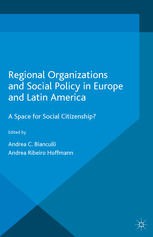Conditions for Effective Regional Social (Health) Policies: The EU and Unasur Compared

It is difficult to elaborate on the development of social policies without alluding to the vital role played by the International Labour Organization (ILO) in developing the idea of a social protection floor (Deacon 2013). The ILO has also been at the forefront in articulating a sharper role for regional organizations in the area of social policies. Its commitment to highlighting the need for regional integration to be anchored around social policies as tools with which to attenuate the negative effects of economic globalization burgeoned especially from 2004. In the course of that year, the ILO issued a commissioned report that considered the various ways in which regional integration could be used to cushion citizens against the debilitating impacts of economic globalization. It made clear that it was useful ‘to build on efforts by regional groupings to promote social cohesion and solidarity among their members’ (World Commission on the Social Dimension of Globalization (WCSDG) 2004, p. 7). The document explored some of the merits and benefits of regional social policies including better resilience to outside economic pressures, stronger political weight notably for smaller countries, enhanced regional capacities and better links to the global economy (WCSDG 2004, p. 71).
